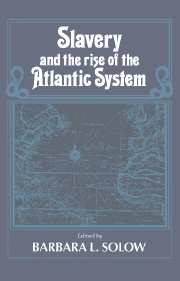Book contents
- Frontmatter
- Contents
- Preface
- List of contributors
- Introduction
- 1 Slavery and colonization
- 2 The Old World background of slavery in the Americas
- 3 Slavery and lagging capitalism in the Spanish and Portuguese American empires, 1492–1713
- 4 The Dutch and the making of the second Atlantic system
- 5 Precolonial western Africa and the Atlantic economy
- 6 A marginal institution on the margin of the Atlantic system: The Portuguese southern Atlantic slave trade in the eighteenth century
- 7 The apprenticeship of colonization
- 8 Exports and the growth of the British economy from the Glorious Revolution to the Peace of Amiens
- 9 The slave and colonial trade in France just before the Revolution
- 10 Slavery, trade, and economic growth in eighteenth-century New England
- 11 Economic aspects of the growth of slavery in the seventeenth-century Chesapeake
- 12 Credit in the slave trade and plantation economies
- Index
7 - The apprenticeship of colonization
Published online by Cambridge University Press: 20 October 2009
- Frontmatter
- Contents
- Preface
- List of contributors
- Introduction
- 1 Slavery and colonization
- 2 The Old World background of slavery in the Americas
- 3 Slavery and lagging capitalism in the Spanish and Portuguese American empires, 1492–1713
- 4 The Dutch and the making of the second Atlantic system
- 5 Precolonial western Africa and the Atlantic economy
- 6 A marginal institution on the margin of the Atlantic system: The Portuguese southern Atlantic slave trade in the eighteenth century
- 7 The apprenticeship of colonization
- 8 Exports and the growth of the British economy from the Glorious Revolution to the Peace of Amiens
- 9 The slave and colonial trade in France just before the Revolution
- 10 Slavery, trade, and economic growth in eighteenth-century New England
- 11 Economic aspects of the growth of slavery in the seventeenth-century Chesapeake
- 12 Credit in the slave trade and plantation economies
- Index
Summary
IN the sixteenth century, Iberian colonists went across three continents, dealt with exotic communities, and tried in several ways to ensure control over natives and exploit conquered territories. Sometimes, however, these practices were antagonistic either to the national mercantile network or to the metropolitan state apparatus. Before the Century of Discoveries came to an end, metropolitan powers resumed European expansion in order to colonize their own colonists.
“Among remote people they built the new kingdom they so much exalted,” Camões wrote in the “Lusíadas.” But how did the overseas “new kingdom” relate to the European “old kingdom?”
Although slavery and coerced labor allowed domination of conquered populations, they did not always entail successful colonial exploitation. These relations of production did not ensure the transformation of surplus labor wrested overseas into trade connected to metropolitan networks. Colonial surplus might be consumed by colonists or traded outside areas under the control of metropolitan powers. Therefore, the establishment of slavery and coerced labor was not a sufficient condition to implement dependent economies in overseas territories occupied by Portugal and Spain.
Moreover, even though the economic surplus of overseas territories was incorporated into the metropolitan network, Iberian expansion did not necessarily lead to the reinforcement of monarchic authority. New power relations emerged inside metropolitan states and conquered territories as mercantile zones expanded and merchants improved their political influence, complicating the ruling of European territorial monarchies.
- Type
- Chapter
- Information
- Slavery and the Rise of the Atlantic System , pp. 151 - 176Publisher: Cambridge University PressPrint publication year: 1991
- 1
- Cited by



